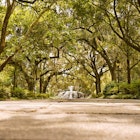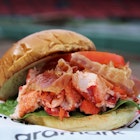

Experience the best of Washington State with this guide to the top things to do © Joel Rogers / Getty Images
Washington’s headline act is its natural environment.
This intricate jumble of deep inlets, high mountains, thick forest, and broad river valleys sprinkled with fruit trees is best enjoyed through some form of self-powered human propulsion, be it on foot, on skis, on two wheels, or with a paddle in your hand.
Playing a more than adequate supporting act are the culture-loaded cities. The region is famed for its glass art, farmers markets, brewpubs, indie music venues and viticulture. For an overarching view of the Lower 48’s most northwesterly state, balance your time between urban and rural.
1. Admire the surreal glass art of Dale Chihuly in Seattle
Eclipsed only by Venice for its innovative glass art, Seattle brings together the magnificent works of Tacoma-born master, Dale Chihuly, in the bright confines of Chihuly Garden and Glass, a beautifully curated museum that lies in the shadow of the iconic Space Needle. One of the largest galleries in the US devoted to one artist, the exhibition rooms present a dazzling kaleidoscope of orbs, sunbursts and delicate crystal.
Detour: Next door to Chihuly and equally extravagant in design is the super-modern Museum of Pop Culture (MoPop) an obligatory musical stop in a city that blessed the world with Nirvana, Jimi Hendrix and Heart, among others.

2. Hike the summer meadows of Paradise on Mt Rainier
Few have the time or tenacity to make it to the glaciated 14,411ft summit of Mt Rainier (the Lower 48’s fifth highest mountain) but substantially more people manage to travel by vehicle to the profuse flower meadows at the national park hub of Paradise. Overlooked by the mountain’s snow-capped dome, this vast natural playground anchored by the handsome Paradise Lodge built in 1916 marks the start of several paths, including the five-mile-long Skyline trail which leads hikers through endless alpine blooms to a 7100ft viewpoint called Panorama Point.
Need more hiking inspiration? Here are Washington State's best walking trails
3. Rent a bike and investigate the “Pig War” on San Juan Island
Largely rural and crisscrossed by a web of winding lanes demarcated by tangled hedgerows, the diminutive San Juan archipelago might have been designed with cycling in mind. Its second largest landfall, San Juan Island, has an unusual history showcased in a national historical park that explores the legacy of one of North America’s most peculiar “conflicts”. The 1859 “Pig War” is the name given to a protracted military stand-off between the Americans and the British over the newly established international border where the only casualty was a local pig. You can find out more about how direct conflict was avoided, and level heads prevailed at two historically themed “camps” located at opposite ends of the island.
Detour: Afterwards, ferry your bike over to nearby Lopez Island, a 30-sq-mile slice of rural tranquility that’s home to a farmers market, vineyard and spring cycling race.
Excited by the idea of an adventure to San Juan Islands? Check out the First timer's guide to plan your trip.

4. Visit one of the US’s finest Indigenous archaeological sites in Neah Bay
Of the many Native American tribes in Washington State, few have preserved their history as eloquently as the Makah, a whaling people who have inhabited the blustery northwestern tip of Washington since time immemorial. In 1970, a Pacific storm uncovered the remains of an ancient Makah village on the coast near Ozette, prompting the site to be comprehensively excavated by a group of American archaeologists working alongside tribal members. Rather than relocate the findings, which included whaling weapons, canoes, spears, and longhouses, the 55,000+ artifacts have been kept on the Makah reservation where they are now displayed in a superb museum in the Makah village of Neah Bay.
Detour: If you’ve traveled this far west, press on to Cape Flattery, 7 miles beyond Neah Bay, the most northwesterly point of the mainland US, a dramatic promontory perched high above the raging Pacific.
5. Wander off the grid in Stehekin
Refreshingly detached from Washington's wider highway network by imposing mountains, Stehekin is an isolated community in the North Cascades that’s impossible to reach by road. To get there, visitors must either catch a boat or seaplane across Lake Chelan, or hike in through the exhilarating wilderness of North Cascades National Park.
Physical isolation has helped foster Stehekin’s unique character. Home to a historic homestead, an organic garden, and a Seattle-quality wilderness bakery, this is a place to sidle up to nature unhindered by the distractions of the 21st-century news cycle. Rent a bike, grab an oar, or mount a horse and enjoy the simple pleasures of life before the internet and cell phones.
Planning tip: The quickest and most popular hiking route to Stehekin starts on Hwy 20 and tracks 23 miles south across the spectacular 5392ft Cascade Pass. It’s mostly snow-free from late June to late September. See the national park website for more information.
Looking for more fantastic places to visit in Washington? Here's our guide to the best

6. Watch nature rejuvenating at Mt St Helens
The hot-headed stratovolcano that blew its top here in May 1980 is a more peaceful place these days with nature slowly recolonizing its post-apocalyptic blast zone. For anyone with a passing interest in volcanology, this is an obligatory geology lesson made infinitely more poignant (and fascinating) since the area was designated a National Volcanic Monument in 1982.
The mountain’s 52-mile approach road (Hwy 504) harbors four different information portals headed up by the Silver Lake Visitors Center at mile 5 and the Johnston Ridge Observatory at mile 52. Both offer an educational assortment of movies, scientific panels, and interpretive trails explaining the finer details of what happened on that fateful day. There’s nowhere else like it in America.
7. Feel the full force of the wild west on Ruby Beach
Battered by sporadic storms and lashed by churning Pacific breakers, Ruby Beach on Washington’s western shoreline is a windswept swathe of sand and rocks guarded by eroded sea-stacks and littered with piles of tree-trunk-sized driftwood. Come here for bracing walks amid wild ocean scenery looking out for bald eagles and colorful starfish. A short forest path descends from Hwy 101 to the beach at the mouth of Cedar Creek.
Detour: Drive 32 miles inland to the less blustery but equally primeval world of the Hoh rainforest, an enchanting domain of lichen-heavy trees and dripping ferns.
Wondering when the best time to visit Washington State is? Check out our seasonal guide

8. Embrace spring tulips and daffodils in La Conner
Tiny La Conner (population 965) packs a sizable punch with its classy B&Bs, niche shops and vivid fields of daffodils, tulips and irises that reach their zenith in spring. Sitting pretty on the flat delta of the fertile Skagit River Valley with the snowy tip of Mt Baker winking in the distance, the town, whose small street grid is lined with salt-of-the-earth restaurants and a trio of arts orientated museums, exudes the air of an upmarket rural retreat. Not surprisingly, it’s gained a reputation as a tranquil weekend getaway for stressed-out Seattleites. For full floral immersion visit the Roozengaarde Display Garden just outside town.
Planning tip: The highlight of La Conner's cultural calendar is the annual Skagit County Tulip Festival in April, an orgy of garden-hopping and florally themed selfies.
9. Sip New World wine in Walla Walla
Washington currently has 20 geographically defined wine growing regions or AVAs each with their own subtleties and nuances but, when it comes to overall tourist infrastructure, there’s only one contender: Walla Walla.
Sequestered in the state’s well-irrigated southeastern corner, the town and its environs produce what are widely regarded as being the best “new” vintages in the US in more than 100 wineries and tasting rooms. Propping up the tourist economy are all the necessary ingredients of a vibrant viticulture: a handsome Main St, a warm, dry climate, and a clutch of fine restaurants that pair memorable vinos with well-nurtured local food.

10. Cross-country ski around Winthrop and the Methow Valley
Cross-country skiing is invariably confined to small parks and designated resorts but, in the Methow Valley, around the compact town of Winthrop, you can ski for days, from hut to hut and lodge to lodge, along 120 miles of interconnected trails run by a local non-profit.
The best starting point is the Sun Mountain Lodge, a self-contained adventure haven with its own trail network perched atop a hill above Winthrop. From here, ski trails link down to the bucolic Methow Valley where several more rustic-chic lodges can rehabilitate your fatigued legs at the end of an invigorating day on the tracks.
The lightly populated valley is bookended by the blink-and-you’ll-miss-it community of Mazama and charming Wild West-themed Winthrop.
Planning tip: Hwy 20, the main road across the North Cascades to Winthrop is closed between late-November and April due to snow blockage. To reach the valley from Seattle during the ski season, you’ll need to take US 2 over Stevens Pass to Wenatchee before switching to Hwys 97 and 15.
11. Go Bavarian in Leavenworth
Leavenworth, Washington’s meticulous recreation of a cute Bavarian village, sits in a spectacular pocket of the Cascade Mountains that’s eerily redolent of the Alps. The former lumber town’s metamorphosis came about in the 1960s when the re-routing of the cross-continental railway threatened to put it unceremoniously out of business. Swapping tree-chopping for tourism, community authorities promptly reinvented Leavenworth with a picturesque German theme complete with gabled “fachwerk” houses, geranium-stuffed flower boxes and bars plying beer and bratwurst. The result is remarkably authentic. Tourists pull over in their droves, not just for the kitschy nutcracker museum and lederhosen wearing restaurant-staff, but for the numerous hiking, rock-climbing and backpacking opportunities that await in the adjacent Alpine Lakes Wilderness.
12. Spend a night in Spokane’s historic Davenport hotel
Washington’s second largest metropolis and capital of the so-called “Inland Empire” doesn’t get the same name-recognition as Seattle or Tacoma. Yet urban underdog Spokane is home to one of the grandest hotels in the US, the opulent Davenport, a deluxe Renaissance-Revival five-star that’s been charming presidents and movie stars since 1914.
Even if you don’t plan on staying the night in one of its historically elegant rooms, it’s worth dropping by this venerable institution to admire the exquisite lobby or nurse a martini beneath the stained-glass ceiling of the in-house Peacock Lounge.
Detour: When in Spokane it would be remiss not to visit downtown Riverfront Park, site of the 1974 World’s Fair, with its SkyRide gondola, hand-carved carousel, and close-up views of powerful Spokane Falls.
Explore related stories






 HistoryExplore the world on a private tour with Lonely Planet Experiences and Travel Curious
HistoryExplore the world on a private tour with Lonely Planet Experiences and Travel CuriousNov 9, 2020 • 2 min read




